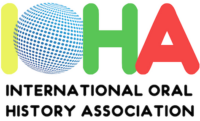Oral history at the 11th Congress of Czech Historians in Olomouc, 13 – 15 September 2017
Naděžda Morávková
On September 13, 2017, the 11th professional meeting of Czech historians began at Palacký University in the city Olomouc. It was the largest meeting of the Czech historical community since the beginning of this tradition in 1937; the number of participants exceeded 800. The demanding program was prepared by the Faculty of Arts of Palacký University in cooperation with the Association of Czech Historians. Also, the range of topics covered at the congress was exceptional. One of the major executive organizers of the meeting, doc. Radmila Svaříčková-Slabáková from the History Department of the Faculty of Arts, PU, stated: “We wanted to organize a meeting similar to the International Congress of Historical Sciences. That is also why we opened our congress to all areas of history, to the professionals as well as to the laity. We show that the contemporary historical research is pluralistic, that it is not only made up by mainstream topics. The response to this is the unprecedented interest of the participant. “[1]
The program consisted of three main sections: Section H01 Creating the historical consciousness of modern society. Teaching and Social Function of History, Section H02 Society in Networks – Economic, Technical and Social Connections and Communications, Section H03 Domestic and Foreign – Migration and Integration Through the Eyes of Czech Historiography and 80 panel discussions.[2] The very high number of panels was unusual; some participants might have even felt self-conscious, as it was not possible to attend everything that an individual-historian was interested in. However, the broad conception of the congress did not allow a different possibility of organization; the Olomouc organizers did a great job notwithstanding. Among the attendants were representatives of all university workplaces, the Czech Academy of Sciences, museums, archives, heritage institutes, as well as legal or pedagogical specialists. The focus of the Congress was not just national, neither by the topics nor by the speakers. Several of the foreign speakers are known to be world experts. The American historian Lynn Hunt, the Emeritus Professor at the University of California in Los Angeles, accepted the invitation and came to the Czech Republic for the very first time. She talked about position of history in post-modern times, current historical trends and the so-called global history. She earned a great recognition and standing ovation because many of the world’s problems of historical science that she mentioned in her speech have also troubled the current community of Czech historians. Issues such as modernity versus tradition, ethnic migration, consumption of contemporary world versus traditional values, the role of historical science and its responsibility in the changed world, historian and society, the rich versus the poor world, the responsibility of Western civilization, how to interpret the past and what of it to pass onto the new generations, in what ways to teach history, etc., have been actually heard in many contributions across panel discussions and in informal discussions during breaks as well. A similar speech – in spite of its specific and at first sight narrow focus – was given by Charles Ingrao, Emeritus Professor of Purdue University in Indiana, on Thursday evening. He spoke about the trends of historical research not only within the topic of the Habsburg monarchy.
The high number of panel discussions and the unexpected interest of the Czech historical community in the congress did not exactly make it easy for the organizers while preparing and ensuring decent and appropriate conditions. The premises of the Faculty of Arts and the Arts Center of Palacký University did not suffice, and so additional, commercial premises must have been used, namely the halls of the Hotel NH Collection Olomouc Congress and the Regional Center Olomouc.
For the first time in the history of Czech historiography, oral history as a separate program panel appeared on the agenda of the Congress of Historians. It was prepared by Prof. PaedDr. et Mgr. Miroslav Vaněk, Ph.D. and PhDr. Pavel Mücke, Ph.D. Two blocks of Wednesday’s conference were therefore filled by interesting and stimulating topics – topics, which currently engage the national oral history the most.
The organizers really excelled this time; the Olomouc Congress was a real festival of Czech historical science and it is necessary to express high regard to the organizers, their hospitality and the professionalism with which they managed to put the congress together. It can be said that the Czech historical community does not have to fear comparisons of their congress with other renowned world congresses of experts. We cannot but wish that thanks to the research activity of the Czech historians, the questions that came out at the congress and the problems that have been opened here will make a desirable progress, and that the next congress will meet this newly set high bar of traditional national meetings of historians.
[1] Available from: http://historieolomouc2017.upol.cz/
[2] See attachment number 1

